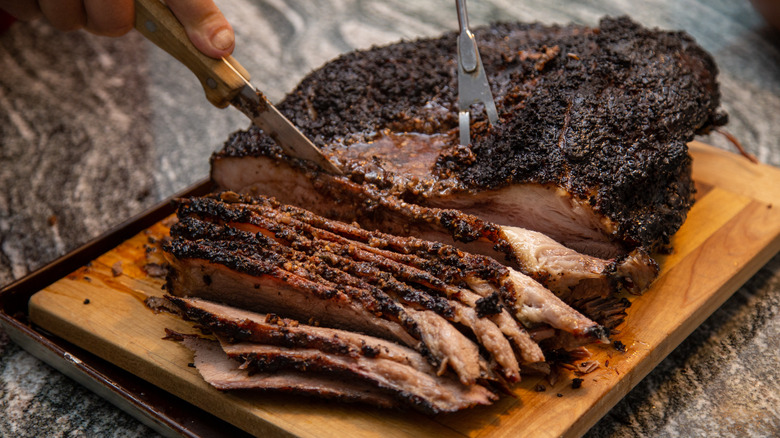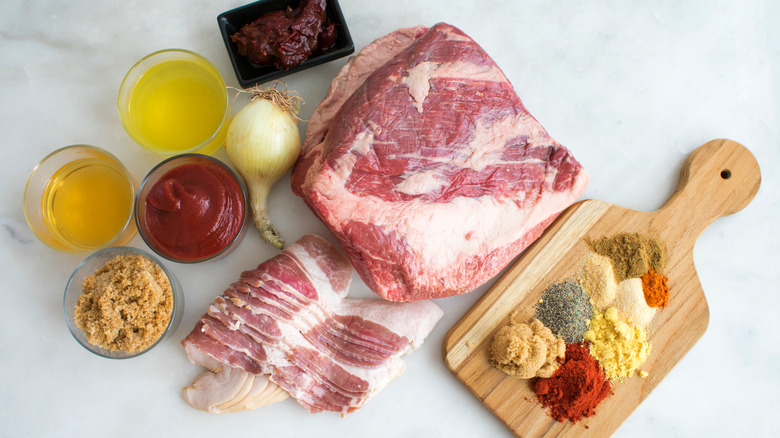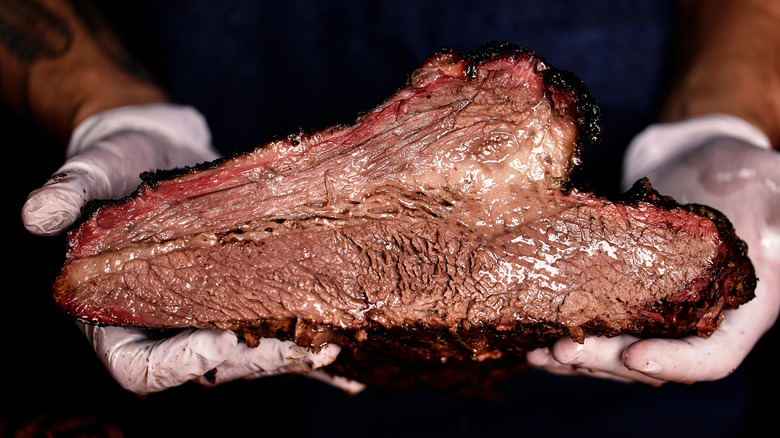The Slept-On Creamy Ingredient You Should Be Slathering On Brisket
Brisket is the king of barbecue. It's tender, juicy, and, if prepared correctly, has a bark on the outside packed with flavor. The prep before the actual smoking process is key to a share-worthy brisket, which includes dressing it up with spices adhered with a binder ingredient — and one controversial condiment gaining popularity in the barbecue scene as a binder is mayonnaise.
While plenty of people have a love-hate relationship with mayo, that shouldn't stop you from considering it for your next brisket. At the end of smoking, there is no discernible mayonnaise taste in the finished dish, similar to how mustard as a binder doesn't result in a tangy brisket. Using mayonnaise as your base helps lock in the meat's moisture and creates an almost silky texture underneath the bark, with some smoking enthusiasts saying it either cuts down on or eliminates the need to spritz the brisket as it smokes.
Along with keeping your brisket tender, the mayonnaise binder helps seasonings easily stick. Gone are the days of seeing your smoky homemade dry rub or pricey store-bought spice mix fall off during cooking. Instead, you can rest at ease knowing that each bite will be perfectly seasoned.
Other binder options for brisket
If you find yourself without any mayonnaise — or your distaste for the divisive condiment is too much — there are other options to use as binders for smoked brisket. Technically, any wet ingredient that can help the rub seasonings stick is considered a binder, but yellow mustard tends to be the go-to ingredient for most barbecue enthusiasts. Dijon mustard is also an alternative with a bit more acidity from the white wine vinegar, though whole grain mustard should be avoided due to its bumpy nature causing an uneven crust.
Besides the realms of mayo and mustard, you can use other condiments as binders, with some good options including ketchup and barbecue sauce. These are great choices because using store-bought sauces acts as a shortcut, or you can try making your own, like this Kansas City barbecue sauce. Just avoid recipes or bottled options where it's more sugar than sauce, as those can cause charring over the hours it takes to smoke a brisket.
The final thing to keep in mind when using a binder is its sodium content. Hot sauce and Worcestershire sauce add lots of flavor, but if you use an overly salty binder along with a salt-heavy rub, your brisket might turn out tasting like a salt lick. Some truly neutral options include oils (such as olive or canola) or salt-free stock. Any of these can be mixed with the rub before being patted onto the cut of meat.
Tips for better brisket
Beyond using the right binder and rub, the most important tip to making delicious brisket is buying the correct piece of meat. Many professional barbecuers recommend the packer cut for brisket, which is where the beef contains both the flat (a leaner cut) and the point (a fattier cut) by being sold whole. This way, you get the best of both worlds, though it requires a longer cooking time due to the larger size.
Patience truly is key when making the perfect brisket. Typically taking around 75 minutes per pound of meat, smoking this cut will be an all-day affair. While tending to the brisket, resist the urge to open the smoker more than necessary. Doing this may cause the temperature to drop, and is the reason "if you're looking, you ain't cooking" is a beloved phrase in the smoking community. Using a probe thermometer, which stays inside the brisket while cooking, can lessen the number of times the lid is opened.
Finally, rig your smoker to help you create delicious barbecue sauce. Placing a pan of water (with a splash of apple juice) below your brisket introduces a little bit of steam to the cooking process and, along with the mayonnaise binder, keeps your brisket extra juicy. After the cooking is finished, simmer the liquid in a saucepan with seasonings, a dash of apple cider vinegar, and some brown sugar until reduced by half. Serve on the side of your brisket for dipping or drizzling.



